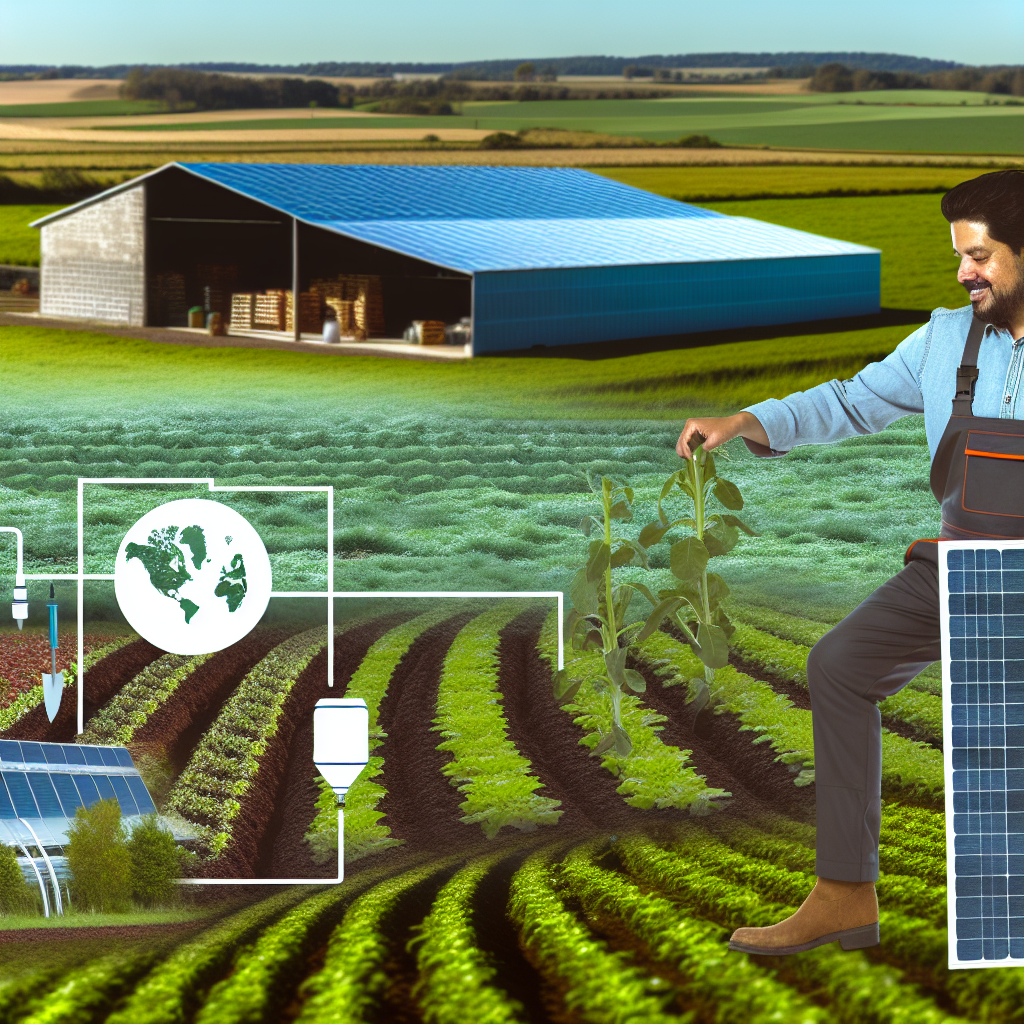Understanding Eco-Friendly Farming
Definition and Importance
Eco-friendly farming focuses on practices that support environmental health.
This approach minimizes pollution and conserves resources.
Furthermore, it enhances biodiversity and soil quality.
Principles of Eco-Friendly Farming
Organic farming is a cornerstone of eco-friendly practices.
It avoids synthetic chemicals in favor of natural solutions.
Crop rotation helps maintain soil fertility over time.
Additionally, integrated pest management controls pests responsibly.
Permaculture seeks to create sustainable agricultural ecosystems.
Benefits of Eco-Friendly Farming
Eco-friendly farming reduces carbon footprints significantly.
It helps preserve water quality by minimizing chemical runoff.
Moreover, this approach often leads to healthier food options.
It promotes community engagement and supports local economies.
Challenges in Implementing Eco-Friendly Practices
Transitioning to eco-friendly methods can be costly for farmers.
Access to resources and technical knowledge might be limited.
Additionally, changes in consumer behavior can pose hurdles.
Transform Your Agribusiness
Unlock your farm's potential with expert advice tailored to your needs. Get actionable steps that drive real results.
Get StartedClimate variability also affects crop yields and practices.
Examples of Eco-Friendly Farming Techniques
Agroforestry combines agriculture and forestry to enhance landscapes.
Cover cropping prevents soil erosion during off-seasons.
Water conservation techniques like rainwater harvesting are essential.
Lastly, community-supported agriculture connects farmers directly to consumers.
Principles of Ethical Farming: Sustainability and Fairness
Understanding Sustainability
Sustainability forms the backbone of ethical farming practices.
A sustainable approach safeguards natural resources for future generations.
Farmers actively strive to maintain ecological balance.
This balance allows farms to thrive while minimizing environmental harm.
Additionally, sustainable farming boosts biodiversity in the ecosystem.
Fairness in Ethical Farming
Fairness encompasses equitable treatment for all stakeholders.
This approach ensures fair wages and working conditions for farm workers.
Moreover, it supports local communities through responsible business practices.
Farmers demonstrate fairness by committing to transparency in their operations.
Consequently, this builds trust with consumers and partners alike.
Key Ethical Farming Practices
Crop rotation enhances soil health and prevents nutrient depletion.
Integrating cover crops increases organic matter and reduces erosion.
Similarly, organic pest management practices limit chemical use.
Each practice contributes to more resilient ecosystems on the farm.
Farmers collaboratively share knowledge to spread best practices.
Community Engagement and Support
Ethical farmers invest in their local communities through various initiatives.
Supporting local markets fosters economic growth and reduces carbon footprints.
Furthermore, community-supported agriculture (CSA) models strengthen ties.
Engaging the public in educational programs promotes ethical awareness.
Showcase Your Farming Business
Publish your professional farming services profile on our blog for a one-time fee of $200 and reach a dedicated audience of farmers and agribusiness owners.
Publish Your ProfileAs a result, consumers feel empowered to make informed choices.
Implementing Organic Practices
Understanding Crop Rotation
Crop rotation is a vital practice in sustainable agriculture.
It involves changing the specific crops grown in a particular area each season.
This technique boosts soil health and prevents the depletion of nutrients.
Furthermore, it disrupts pest and disease cycles naturally.
By selecting a diverse range of crops, farmers can enhance biodiversity.
Crop rotation also minimizes the need for chemical fertilizers and pesticides.
Benefits of Enhancing Soil Health
Healthy soil supports vigorous plant growth and resilience.
It improves water retention, reducing irrigation needs.
Moreover, it helps filter pollutants and assists in carbon sequestration.
Organic matter in the soil fosters beneficial microbial life.
This interaction leads to natural nutrient availability for plants.
Practices to Improve Soil Health
One effective method is adding organic amendments like compost.
Cover crops can further enhance soil structure and fertility.
These crops prevent erosion and fix nitrogen naturally.
Additionally, reduced tillage practices help maintain soil integrity.
Implementing these techniques can noticeably improve crop yield.
Integrating Organic Practices
Integrating organic practices involves careful planning and management.
Farmers can benefit by utilizing local resources and knowledge.
Engaging with community networks enhances learning and support.
Furthermore, educating consumers about organic farming builds demand.
Consumer awareness drives more farmers to adopt sustainable methods.
Gain More Insights: Understanding CSA Subscription Models for Farms
Water Conservation Techniques in Eco-Friendly Farming
Importance of Water Conservation
Water conservation is essential in eco-friendly farming.
It helps maintain sustainable agricultural practices.
Moreover, it minimizes the impact on local water resources.
Drip Irrigation Systems
Drip irrigation is an efficient watering method.
This system delivers water directly to the plant roots.
Consequently, it reduces evaporation and runoff.
Rainwater Harvesting
Collecting rainwater is a practical water conservation strategy.
Farmers can use stored rainwater for irrigation.
This practice lessens reliance on groundwater supplies.
Mulching Techniques
Using organic mulch improves soil moisture retention.
Mulch prevents weed growth, which competes for water.
Additionally, it enhances soil health over time.
Crop Selection and Rotation
Selecting drought-resistant crops is crucial in water conservation.
Crops like sorghum and millet require less water.
Moreover, rotating crops can improve soil moisture levels.
Soil Management Practices
Implementing no-till farming enhances soil structure.
This boosts its capacity to retain moisture.
Showcase Your Farming Business
Publish your professional farming services profile on our blog for a one-time fee of $200 and reach a dedicated audience of farmers and agribusiness owners.
Publish Your ProfileAdditionally, cover crops can help prevent erosion.
Technological Innovations
Modern technology aids in efficient water use.
Soil moisture sensors provide real-time data.
Farmers can irrigate only when necessary, saving water.
Discover More: Local Food Systems And Sustainable Agriculture Growth
Integrating Livestock and Crop Production
Benefits of Agroecology
Agroecology combines crop and livestock farming for better sustainability.
This practice enhances biodiversity and improves soil health.
Farmers can reduce dependency on chemical inputs.
Integrating livestock adds nutrients back into the soil.
Also, it helps in managing pests naturally.
In addition, livestock can graze cover crops, preventing weeds.
These practices promote a diverse ecosystem on the farm.
Crop-livestock systems can increase overall farm productivity.
With diversified production, economic risks decrease.
Farmers such as Maria Gonzalez have successfully adopted this strategy.
She raises chickens alongside her vegetable crops.
Maria reports healthier plants and reduced disease pressure.
Moreover, integrating livestock allows for more efficient resource use.
Water and land resources become more productive and less stressed.
This leads to better resilience against climate change.
Lastly, consumers increasingly seek products from sustainable farms.
Thus, agroecology offers both environmental and market advantages.
You Might Also Like: Tips for Successful Local Food Sourcing Initiatives

The Role of Permaculture in Sustainable Agriculture
Understanding Permaculture Principles
Permaculture combines agriculture with design principles.
It aims to create sustainable and self-sufficient ecosystems.
This approach mimics natural ecosystems, promoting biodiversity.
Moreover, it focuses on the efficient use of resources.
Such practices enhance soil fertility and reduce erosion.
Designing Integrated Systems
Permaculture emphasizes integrated farming systems.
These systems include crops, animals, and natural elements.
For instance, crops can benefit from shade provided by trees.
Additionally, animals can contribute to soil health through manure.
Thus, each component plays a role in the ecosystem.
Water Management Strategies
Effective water management is critical in permaculture.
Techniques like rainwater harvesting are essential.
Furthermore, swales can help direct water flow efficiently.
These strategies conserve water and enhance soil moisture.
Consequently, crops thrive even in arid conditions.
Benefits of Permaculture Practices
Permaculture offers numerous benefits to farmers and the environment.
First, it increases yield stability over time.
Showcase Your Farming Business
Publish your professional farming services profile on our blog for a one-time fee of $200 and reach a dedicated audience of farmers and agribusiness owners.
Publish Your ProfileSecond, it reduces dependence on chemical inputs.
Overall, permaculture promotes resilience and adaptability.
Farmers can better withstand climatic changes and challenges.
Uncover the Details: Benefits of Seasonal Eating for Sustainable Farming
Reducing Carbon Footprint: Renewable Energy in Farming
Importance of Renewable Energy
Renewable energy is crucial for sustainable farming practices.
It helps reduce reliance on fossil fuels significantly.
Farm operations can operate more efficiently with renewable sources.
Also, using clean energy lowers greenhouse gas emissions.
Types of Renewable Energy Sources
Farmers can utilize various renewable energy sources.
Solar energy systems convert sunlight into electricity.
Wind turbines can generate power from natural wind resources.
Biomass provides energy through organic materials like crop waste.
Hydropower harnesses the energy of flowing water for farming needs.
Case Studies of Successful Implementation
Several farms are successfully using renewable energy today.
The Green Valley Farm, for instance, uses solar panels effectively.
It powers all operations and even sells excess energy back to the grid.
Similarly, the Windy Acres Farm operates a wind turbine.
This setup supplies power for irrigation and processing facilities.
Benefits of Adopting Renewable Energy
Utilizing renewable energy brings numerous benefits.
- It lowers energy costs significantly over time.
- Farmers become less vulnerable to energy price fluctuations.
- Renewable energy options enhance farm sustainability.
- They contribute positively to rural economies.
Challenges in Transitioning to Renewable Energy
Despite the benefits, challenges exist in transitioning to renewables.
Initial costs for setting up renewable energy systems can be high.
Farmers may lack technical knowledge about these systems.
Additionally, local regulations may complicate installations.
Strategies for Overcoming Challenges
Farmers can take steps to overcome these hurdles effectively.
- Research government incentives for renewable energy adoption.
- Seek partnerships with renewable energy companies.
- Participate in community renewable energy programs.
Education and training programs can also help empower farmers.
Community Involvement and Education in Ethical Farming Practices
The Role of Community in Farming
Community involvement is essential for promoting ethical farming practices.
Local farmers can benefit from shared knowledge and resources.
Community gardens encourage participation and awareness.
Collaborative efforts can lead to sustainable farming solutions.
Educating Farmers and Consumers
Education empowers both farmers and consumers to make informed choices.
Workshops and seminars can teach sustainable practices.
Local schools can introduce agricultural education early on.
Furthermore, online resources can reach a wider audience.
Engaging Local Organizations
Local organizations can play a vital role in agricultural education.
They can provide support through funding and resources.
Partnerships with universities can enhance research and development.
Moreover, collaborations can create community-led initiatives.
Promoting Awareness Through Events
Community events can celebrate local farming and sustainability.
Farmers’ markets raise awareness about ethical products.
Additionally, farm tours allow consumers to see practices firsthand.
Showcase Your Farming Business
Publish your professional farming services profile on our blog for a one-time fee of $200 and reach a dedicated audience of farmers and agribusiness owners.
Publish Your ProfileThese activities foster a connection between producers and consumers.
Additional Resources
Transforming Your Restaurant: A Guide to Transitioning from …




